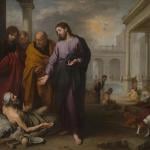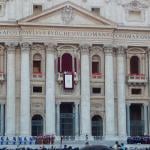Acts 9:1-9
But Saul, still breathing threats and murder against the disciples of the Lord, went to the high priest and asked him for letters to the synagogues at Damascus, so that if he found any belonging to the Way, men or women, he might bring them bound to Jerusalem. Now as he journeyed he approached Damascus, and suddenly a light from heaven flashed about him. And he fell to the ground and heard a voice saying to him, “Saul, Saul, why do you persecute me?” And he said, “Who are you, Lord?” And he said, “I am Jesus, whom you are persecuting;† but rise and enter the city, and you will be told what you are to do.” The men who were traveling with him stood speechless, hearing the voice but seeing no one. Saul arose from the ground; and when his eyes were opened, he could see nothing; so they led him by the hand and brought him into Damascus. And for three days he was without sight, and neither ate nor drank.Acts 22:6–11
“As I made my journey and drew near to Damascus, about noon a great light from heaven suddenly shone about me. And I fell to the ground and heard a voice saying to me, ‘Saul, Saul, why do you persecute me?’ And I answered, ‘Who are you, Lord?’ And he said to me, ‘I am Jesus of Nazareth whom you are persecuting.’ Now those who were with me saw the light but did not hear the voice of the one who was speaking to me. And I said, ‘What shall I do, Lord?’ And the Lord said to me, ‘Rise, and go into Damascus, and there you will be told all that is appointed for you to do.’ And when I could not see because of the brightness of that light, I was led by the hand by those who were with me, and came into Damascus.Acts 26:12–18
“Thus I journeyed to Damascus with the authority and commission of the chief priests. At midday, O king, I saw on the way a light from heaven, brighter than the sun, shining round me and those who journeyed with me. And when we had all fallen to the ground, I heard a voice saying to me in the Hebrew language, ‘Saul, Saul, why do you persecute me? It hurts you to kick against the goads.’ And I said, ‘Who are you, Lord?’ And the Lord said, ‘I am Jesus whom you are persecuting. ¶ But rise and stand upon your feet; for I have appeared to you for this purpose, to appoint you to serve and bear witness to the things in which you have seen me and to those in which I will appear to you, delivering you from the people and from the Gentiles—to whom I send you ¶ to open their eyes, that they may turn from darkness to light and from the power of Satan to God, that they may receive forgiveness of sins and a place among those who are sanctified by faith in me.’
There are, curiously, three slightly different versions of the conversion of St. Paul in Acts. Squinty skeptics, imagining that slightly different wording is always an occasion to accuse a biblical author of “contradiction” and to look for “holes in the story” make much of these trivial differences. They remind me of JFK conspiracy theorists who hyper-focus on granular details and miss the wood for the trees.
If the three stories had been written by three different evangelists we would long ago have worked out the Matthean, Markan, and Lukan “Pauls” and come up with whole elaborations about why Markan Paul calls Jesus “Jesus of Nazareth” while Matthean and Lukan Paul call him Jesus. But since it’s all just Luke telling the story three different times we don’t have the luxury of building those exegetical castles in the air. Occam’s Razor suggests that it’s just Luke telling the story the way humans do, with slightly different wording each time because that what humans do when they tell the same story three times.
You can see the the same thing in the Eucharistic narratives. Here are, arguably, the most important words Jesus ever spoke. Unlike the sayings in the Sermon on the Mount and the rest of his public preaching, which are bound to have been said different ways on different occasions, the words of institution can only have been said once. And yet the early Church is remarkably loosey goosey about them:
“Take, eat; this is my body.” (Matthew).
“Take; this is my body.” (Mark)
“This is my body which is given for you. Do this in remembrance of me.” (Luke)
“This is my body which is for you. Do this in remembrance of me.” (Paul)
Fools say, “That’s because it never happened!” Wise people realize, “That’s because this is how oral communities remember things.” They remember the gist and don’t sweat getting the exact words right as a rule. Sometimes, when the teacher is a good one, he will formulate his aphorisms and slogans in catchy phrases that stick in the brain: “Ask and it shall be given to you. Seek, and you shall find. Knock and the door shall be opened.” Those words are the same in the two different gospels that record them. Why? Because they were spoken a zillion times in Jesus’ public preaching and had the quality of catch phrases. But the words of institution were only spoken once. They meant the world to the Church, but the Church only remembered the core meaning, not the ipsissima verbi, the exact words.
Moral: the early Christians were remarkably like human beings.
But Paul’s encounter on the Damascus Road also curiously is recalled with exactly the same words three different times: “Saul, Saul, why do you persecute me?” Every single account has the exact same words.
Why?
Think back to some core memory in your own life. A defining turning point: “It’s a boy!” “You have breast cancer.” “I love you.” “You got the job!” “Your father is dead.” It could be something common to us all or it could be, as here, a religious experience that changed you forever. In my own life, I had a mystical experience once in which I was asked by Jesus, or an angel (I’m not sure) “Will you come and help do the work of worship?” Those words, exactly. I will never forget them as long as I live. I can’t tell you the exact day or hour it happened. I can tell you where (our first apartment) and roughly when (summer day, sometime in 1986-87ish). I can tell you some of the circumstances. But the *core* of the experience was those words.
Paul seems to have had something of that kind of experience. Minor details change. He elaborates other aspects of the experience depending, perhaps, on how his own perception of the meaning grows over time and with experience, or perhaps depending on what he is trying to get across to his audience, or depending on what Luke is trying to get across to his audience. But the absolute core of the story, the thing that changed Paul forever, were the astonishing words “Saul, Saul, why do you persecute me?” and the mind-blowing realization of who was asking him that question.
My entire life since that experience and that question has been an attempt to unpack the full meaning of that question. And I am convinced in my marrow that Paul’s entire life, all his letters, all his work, and all his sufferings were likewise an attempt to unpack the meaning of the question Jesus put to him. This is why it is absolutely impossible that Paul would have ever conceived of “I believe in Jesus, but I don’t believe in the Church.” Impossible. For Paul, the union of the Church with Jesus is the foundational revelation. When Paul speaks of the Church as the Body of Christ (and, by the way, he is the only person in Scripture who does) he is not kidding around. When he declares: “There is one body and one Spirit, just as you were called to the one hope that belongs to your call, one Lord, one faith, one baptism, one God and Father of us all, who is above all and through all and in all.” (Eph 4:4–6), he is speaking from his absolute guts and with utter fidelity to the vision given him on the Damascus road. All his labors for the Church come from it. All his love for Christ is poured out in love for that Church *because* to love the Church is to love Christ. At some primal level, for Paul, Jesus and the Church are simply one with Christ the head and us his body.















